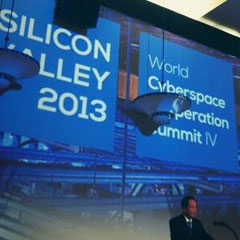Delivering the keynote speech to more than 300 participants from 40 countries at the opening session of the EastWest Institute's 4th Worldwide Cyberspace Cooperation Summit at Stanford University, Cai Mingzhao, Minister of the State Council Information Office of China called for "strengthening international cooperation in cybersecurity," and made three distinct proposals to promote a more secure cyberspace.
Cai noted that the Internet is "a major driving force" in China's economic transformation, but that the country faces enormous cyber threats. "More than 80 percent of Chinese Internet users have fallen victim to cyber attacks," and more than 20,000 China-based websites were "modified by hackers," he said, causing severe damage to the economy.
Cai's proposals included using the framework of the United Nations to help define the rules of the road in cyberspace in a way that protects the interests of all parties; exploring "effective means to tackle urgent problems...such as cyber attacks, viruses and cyber terrorism; and creating "communication channels to facilitate international cooperation."
"The United States and China are Internet giants," Cai said. "We share many common interests and there is enormous scope for cooperation." He pointed to the closing down of the biggest Chinese-language pornographic website, the Sunshine Entertainment Alliance, as the result of successful cooperation of the police forces of both countries.
But Cai rejected the notion that the national norms no longer apply in cyberspace. "The Internet is global, but at the same time it belongs to different countries," he said, calling for everyone "to show respect for national sovereignty in cyberspace."
In subsequent panels, top cyber experts pointed to encouraging signs of progress in international cyber cooperation, although pointing out that it is still far from adequate.
EWI Distinguished Fellow Latha Reddy, the former Deputy National Security Advisor of India, vowed: "India will enhance global cooperation" on cybersecurity. Christopher Painter, the U.S. State Department's Coordinator for Cyber Issues, hailed recent efforts to bring the policy and technical communities together in solving problems, and recent U.S.-Russia cooperative efforts. "No one wants a cyberspace that is a source of constant conflict," he said.
But conflict and tensions remain. Dirk Brengelmann, the Commissioner for International Cyber Policy of the German Foreign Ministry, pointed out that for Germans human rights are closely connected to "privacy'--alluding to the recent spying revelations.
Scott Charney, Corporate Vice President of Microsoft added: "There is so much rhetoric about about government-to-government cooperation, and at the same time they may be attacking each other."
In partnership with the Stanford Institute for Economic Policy Research at Stanford University and the IEEE Communications Society, EWI also sponsored "breakthrough" groups that built on the work of previous summits. Topics included: Optimizing Policy for Secure Cloud Enablement; International Critical Infrastructure Protection; Emergency Preparedness for the Financial Services Sector for International Crises in Cyberspace; and Acts of Aggression in Cyberspace. The first day of the conference also featured a special presentation on Measuring the Cybersecurity Problem, a just-released report by EWI.
Following the successes of the previous annual summits in New Delhi, London and Dallas, this conference brings together an international group of cyber experts, leaders and practitioners from both the private and public sectors. During this two-day event, participants have the opportunity to address critical security areas where international policy has failed to make progress and propose new solutions.
Other key speakers include Michael Chertoff, Chairman and Co-Founder of the Chertoff Group and former U.S. Secretary of Homeland Security; Steven Chu, Nobel Prize winner and former U.S Secretary of Energy; Joseph S. Nye Jr., Harvard University's Distinguished Service Professor; and former dean of the Kennedy School. Ellen Richey, Chief Enterprise Risk Officer, Visa; William J. Perry, Michael and Barbara Berberian Professor at the Freeman Spogli Institute for International Studies, Stanford University; George P. Shultz, Thomas W. and Susan B. Ford Distinguished Fellow, Hoover Institution, Stanford University; and John L. Hennessy, President, Stanford University.
In his opening remarks, EastWest Institute President John Mroz declared: "Our 4thsummit is a place where honest frank discussion must take place to improve our global cybersecurity."
The recommendations of the Silicon Valley summit will be pursued over the course of the next year, forming the basis for discussions at the 5th Worldwide Cybersecurity Summit that will be held in Europe in 2014.
We are tweeting about the summit under #cybersummit2013. The full agenda and other information is available at www.cybersummit.info.
